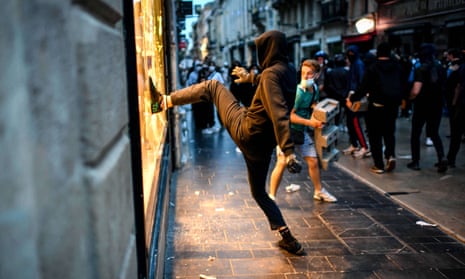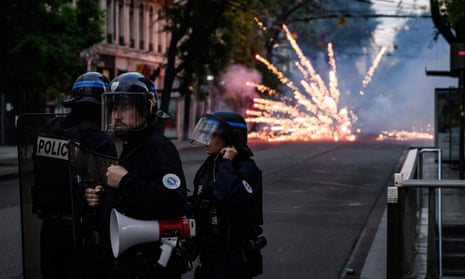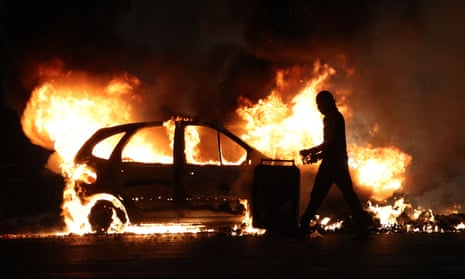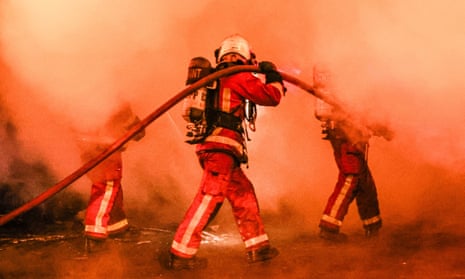Nearly 1,000 arrested overnight
Jonathan Yerushalmy
Nearly 1,000 people in France were arrested and 80 police injured during a fourth night of unrest triggered by the fatal police shooting of a teenager, but officials claimed the situation was calmer than on the previous night.
Forty-five thousand police officers, including special forces, were deployed to respond to rioting across the country on Friday night, with the situation in two major cities – Marseille and Lyon – highlighted as particular chaotic, with buildings and vehicles torched and stores looted.
The ministry of the interior reported 994 were arrests made throughout France overnight, while 79 police and gendarmes were injured and 2,560 fires on public roads recorded. Despite this, the ministry said the protests were “of a lower intensity compared to the previous night”.
More than 80 arrests were made in Marseille, according to the interior ministry, and “significant reinforcements” were sent after the mayor, Benoit Payan, called on the national government to immediately send additional troops.
“The scenes of pillaging and violence are unacceptable,” Payan tweeted late on Friday, after police clashed with protesters.
Key events

Miranda Bryant
British holidaymakers travelling to France have been warned they could face disruption after four nights of unrest in reaction to the police killing of a 17-year-old boy of Algerian and Moroccan descent.
The Foreign Office has changed its travel advice, warning of the potential for disruption to travel, curfews and that the “location and timing of riots are unpredictable”.
The updated advice said:
Since 27 June, riots have taken place across France. Many have turned violent. Shops, public buildings and parked cars have been targeted. There may be disruptions to road travel and local transport provision may be reduced.
Some local authorities may impose curfews. Locations and timing of riots are unpredictable. You should monitor the media, avoid areas where riots are taking place, check the latest advice with operators when travelling and follow the advice of the authorities.
How did the riots start?
The unrest flared nationwide after Nahel M, a 17-year-old of Algerian and Moroccan descent, was shot by police on Tuesday during a traffic stop in a Paris suburb. His death, caught on video, has reignited longstanding complaints of police violence and racism.
The 38-year-old officer involved in the shooting, who has said he fired the shot because he feared he and his colleague or someone else could be hit by the car, has been charged with voluntary homicide and placed in provisional detention.
Nahel is due to be buried in a ceremony later today, according to the mayor of Nanterre, the Paris suburb where he lived and was killed. The family’s lawyers have asked journalists to stay away, saying it was “a day of reflection” for Nahel’s relatives.
Mayor Patrick Jarry said:
There’s a feeling of injustice in many residents’ minds, whether it’s about school achievement, getting a job, access to culture, housing and other life issues … I believe we are in that moment when we need to face the urgency [of the situation].
Analysis: police tactics questioned after latest killing

Jon Henley
The fatal shooting of a 17-year-old boy of north African descent during a police traffic stop in a Paris suburb, and the four consecutive nights of violence and rioting it has triggered, have once more thrown a spotlight on France’s policing structures and methods.
The office of the UN high commissioner for human rights (OHCHR) on Friday became the latest international organisation to criticise French policing, saying the shooting was a “moment for the country to seriously address the deep issues of racism and racial discrimination in law enforcement”.
The OHCHR spokesperson, Ravina Shamdasani, said authorities should ensure that the use of police force “always respects the principles of legality, necessity, proportionality, non-discrimination, precaution and accountability”.
The death of the teenager, identified as Nahel M, was the third fatal shooting by police during traffic stops in France in 2023. There were a record 13 such shootings last year, three in 2021 and two in 2020. Most of the victims since 2017 have been of black or Arab origin, reinforcing claims by rights groups of systemic racism within French law enforcement agencies.
“We have to go beyond saying that things need to calm down,” said Dominique Sopo, the head of the campaign group SOS Racisme. “The issue here is how we to ensure we have a police force that, when they see blacks and Arabs, don’t tend to shout at them [but] use racist terms against them and in some cases shoot them in the head.”
Beyond an institutional racism common in many police forces, French policing has a tendency to violence that has been highlighted by groups including Amnesty International, Human Rights Watch and the Council of Europe. Police truncheons, teargas grenades, rubber bullets and larger “flash balls” have inflicted extensive physical injuries during demonstrations.
Long a taboo subject, French policing – seen by many critics as instinctively repressive and favouring disproportionate force – has become a major political issue, particularly since the gilets jaunes protests of 2018 and 2019 in which an estimated 2,500 protesters were injured, several of whom lost eyes or limbs.
Here are some images from. the unrest overnight:




Nearly 1,000 arrested overnight

Jonathan Yerushalmy
Nearly 1,000 people in France were arrested and 80 police injured during a fourth night of unrest triggered by the fatal police shooting of a teenager, but officials claimed the situation was calmer than on the previous night.
Forty-five thousand police officers, including special forces, were deployed to respond to rioting across the country on Friday night, with the situation in two major cities – Marseille and Lyon – highlighted as particular chaotic, with buildings and vehicles torched and stores looted.
The ministry of the interior reported 994 were arrests made throughout France overnight, while 79 police and gendarmes were injured and 2,560 fires on public roads recorded. Despite this, the ministry said the protests were “of a lower intensity compared to the previous night”.
More than 80 arrests were made in Marseille, according to the interior ministry, and “significant reinforcements” were sent after the mayor, Benoit Payan, called on the national government to immediately send additional troops.
“The scenes of pillaging and violence are unacceptable,” Payan tweeted late on Friday, after police clashed with protesters.
Rioters will not win, says minister
Welcome to our live coverage of the ongoing unrest in France, which flared nationwide after Nahel M, a 17-year-old of Algerian and Moroccan descent, was shot by police on Tuesday during a traffic stop in a Paris suburb.
His death, caught on video, has reignited longstanding complaints of police violence and racism.
Nearly 1,000 people were arrested and 80 police injured during the fourth night of protests.
Forty-five thousand police officers, including special forces, were deployed to respond to rioting across the country on Friday night, with the situation in two major cities – Marseille and Lyon – highlighted as particular chaotic, with buildings and vehicles torched and stores looted.
However, officials claimed the situation was calmer than on the Thursday night.
France’s interior minister, Gérald Darmanin, met with police in the early hours of Saturday and denounced the “unacceptable violence in Lyon and Marseille” where public demonstrations were banned and public transport halted.
“It’s the republic that will win, not the rioters,” he said.
We’ll bring you the latest updates throughout the day.

